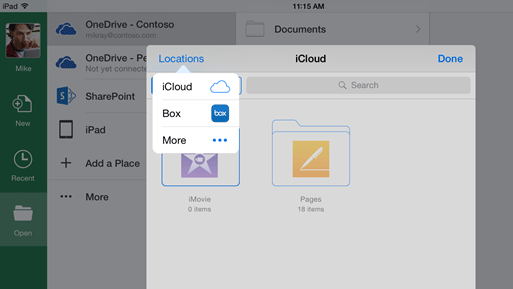News
Microsoft Adds Storage Options to Office Apps, Launches Cloud Storage Partner Program
- By Kurt Mackie
- February 18, 2015
Microsoft this week added more cloud-based storage options to its mobile Office apps, as well as kicked off a new partner program that's aimed at improving the Office Online experience.
Kirk Koenigsbauer, corporate vice president for Office, announced on Tuesday that storage service providers can now surface their storage locations right within iOS Office apps. This is done using a Location "file picker" within the app, which provides an easier way for end users to save their documents to those services.
Koenigsbauer's announcement includes a screenshot showing the ability to use an iPad device to access iCloud, Box and other storage services by just clicking the "Locations" menu selection (see image).

This new file picker feature for iOS currently works with iPads and iPhones, but Microsoft plans to enable similar capabilities for other platforms. It will be available for Office apps running on Android devices, as well as Office universal apps running on Windows 10 devices, Koenigsbauer stated, although he didn't provide a timeline.
Also this week, Microsoft announced a new Cloud Storage Partner Program centered on Office Online. Office Online is Microsoft's collection of browser-enabled apps (Excel, Word, OneNote, Outlook, PowerPoint and OneDrive), formerly known as "Office Web Apps." The partner program is centered on improving the document view and edit experience of Office Online apps when using cloud-based storage services. Microsoft currently counts Box, Citrix and Salesforce.com as already being part of this new program.
This week's announcement adds to Microsoft's announcement back in November that it had partnered with Dropbox on Office integration. That integration effort, which will enable easier file access, editing and file sharing using Office apps for Android and iOS devices, is expected to coalesce sometime in the first half of this year.
Box, for its part, had previously partnered with Microsoft on Office 365 integration. A recent Box blog post described Microsoft's efforts as "boldly taking an open path for Office 365" that will benefit customers and industry. With regard to the iOS Office apps integration, the blog post explained that "the Box content platform will now support native integrations with both Office for iPad and iPhone as well as for Office Online."
Longtime Microsoft partner Citrix indicated this week that it has worked in recent years to integrate Office 2013 and Office 365 with its ShareFile service, which is designed to enable the sharing of large business files via Web browsers. ShareFile has had "support for native previewing of Office documents" for more than a year. Since October, ShareFile has had the ability to "edit documents stored in SharePoint Online and OneDrive for Business," according to Citrix's announcement.
Microsoft built new RESTful APIs for its Office apps, making it easier for developers to integrate their services. Possibly, these new APIs may be accelerating Microsoft's partnerships with partners, such as the cloud service providers.
Microsoft's Office apps and Office Online announcements seem to have a theme of sorts. The aim seems to be to broaden access to Office apps, regardless of platform, and regardless of potential competition in the cloud-based storage space.
"While these may seem like small enhancements, these new features represent a big step forward for Office integration into the apps and services that are important to our customers," Koenigsbauer explained.
The cloud storage providers partnering with Microsoft can also be viewed as potential competitors since Microsoft has its own OneDrive and OneDrive for Business cloud-based storage services. OneDrive for Business typically gets bundled into Microsoft's Office 365 service plans with unlimited storage, while the OneDrive service is largely free to use by consumers for up to 15GB of storage (Microsoft charges for additional storage space).
Similarly, Microsoft's Office apps for iOS and Android are free to use by consumers, and its Office universal apps for Windows 10, currently at the preview stage, likely will follow that same plan. It's thought that business users may have to purchase Office 365 subscriptions to create content with them, but Microsoft hasn't provided all of the details yet.
About the Author
Kurt Mackie is senior news producer for 1105 Media's Converge360 group.